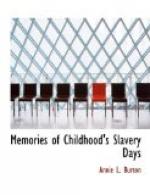The cabin that was now our home was made of logs. It had one door, and an opening in one wall, with an inside shutter, was the only window. The door was fastened with a latch. Our beds were some straw.
There were six in our little family; my mother, Caroline, Henry, two other children that my mother had brought with her upon her return, and myself.
The man on whose plantation this cabin stood, hired my mother as cook, and gave us this little home. We children used to sell blueberries and plums that we picked. One day the man on whom we depended for our home and support, left. Then my mother did washing by the day, for whatever she could get. We were sent to get cold victuals from hotels and such places. A man wanting hands to pick cotton, my brother Henry and I were set to help in this work. We had to go to the cotton field very early every morning. For this work, we received forty cents for every hundred pounds of cotton we picked.
Caroline was hired out to take care of a baby.
In 1866, another man hired the plantation on which our hut stood, and we moved into Clayton, to a little house my mother secured there. A rich lady came to our house one day, looking for some one to take care of her little daughter. I was taken, and adopted into this family. This rich lady was Mrs. E. M. Williams, a music teacher, the wife of a lawyer. We called her “Mis’ Mary.”
Some rich people in Clayton who had owned slaves, opened the Methodist church on Sundays, and began the work of teaching the negroes. My new mistress sent me to Sunday school every Sunday morning, and I soon got so that I could read. Mis’ Mary taught me every day at her knee. I soon could read nicely, and went through Sterling’s Second Reader, and then into McGuthrie’s Third Reader. The first piece of poetry I recited in Sunday school was taught to me by Mis’ Mary during the week. Mis’ Mary’s father-in-law, an ex-judge, of Clayton, Alabama, heard me recite it, and thought it was wonderful. It was this:
“I am glad to see you,
little bird,
It was your sweet song I heard.
What was it I heard you say?
Give me crumbs to eat today?
Here are crumbs I brought
for you.
Eat your dinner, eat away,
Come and see us every day.”
After this Mis’ Mary kept on with my studies, and taught me to write. As I grew older, she taught me to cook and how to do housework. During this time Mis’ Mary had given my mother one dollar a month in return for my services; now as I grew up to young womanhood, I thought I would like a little money of my own. Accordingly, Mis’ Mary began to pay me four dollars a month, besides giving me my board and clothes. For two summers she “let me out” while she was away, and I got five dollars a month.
While I was with Mis’ Mary, I had my first sweetheart, one of the young fellows who attended Sunday school with me. Mis’ Mary, however, objected to the young man’s coming to the house to call, because she did not think I was old enough to have a sweetheart.




